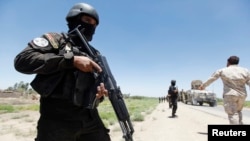In the southern Iraqi city of Basra, hundreds of fresh recruits train, preparing to join the battle against Sunni militants who have been strengthening their grip on large swaths of the north and east.
Meanwhile, in the capital city of Baghdad, officials marked the arrival of more U.S. military advisers.
“Their primary mission now is to assess the capabilities of the Iraqi army in and around Baghdad,” said Colonel Steve Warren, a Pentagon spokesman.
The U.S. now has six teams – with a total of 90 commandos – in the capital, but they’ll need two or three weeks to complete assessments, Warren said.
Another 90 U.S. military personnel have started running a Joint Operations Center in Baghdad. Reconnaissance flights also continue around the clock, though, for now, no U.S. airstrikes have been ordered.
As many as 300 U.S. military advisers ultimately may be sent to assist the Iraqi military’s fight against insurgents.
Reports of Syrian airstrikes this week inside Iraq are cause for concern.
“The answer to Iraq’s problems right now is not military. It’s certainly not Syrian airstrikes in western Iraq. The answer is a political solution,” Warren said.
The Syrian strikes against the Islamic State of Iraq and the Levant, or ISIL, also drew criticism from U.S. State Department spokeswoman Marie Harf.
“Iraq’s security situation cannot and should not be resolved by the Assad regime, by airstrikes from the Assad regime, or by militias funded and supported by other countries in the region,” Harf said.
Harf's mention of "other countries" was an apparent reference to Iran, a longtime supporter of Shi'ite militias in Iraq.
Pentagon officials refuse to discuss reports that Iran is flying surveillance drones from an airfield in Baghdad. But they say the U.S. is continuing to provide Iraq with supplies and ammunition, including another 200 Hellfire missiles to be delivered over the coming weeks.




